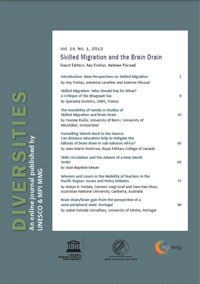Brain drain/brain gain from the perspective of a semi-peripheral state: Portugal
by Isabel Estrada Carvalhais (University of Minho, Portugal)
This paper analyses the recent Portuguese governmental answers to deal with its semi-peripheral position in the science and technology market in general, and in the international market of brain circulation in particular. The management of brain circulation is understood thus as only a small part of a wider public policy regarding the management of scientific and technological production and dissemination, as well as the management of access to education and training resources.
This paper’s analysis of the public policy built to manage the country’s position in the international market of scientific and technological knowledge suggests that the country’s semi-peripheral condition in regard to various markets (economic, as well as cultural, scientific and academic) has been the dominant pillar of its policy’s structuring. It is thus through the lenses of its semi-peripheral condition that much of the country’s governmental answers become intelligible. A second dominant pillar is the European context and the consequent need to comply with the expectations raised by the Agenda of Lisbon. But, as the paper suggests, Lisbon’s Agenda has worked over the last years mostly as a political binder that has enabled the implementation of measures otherwise financially too heavy, while very much needed to bring the Portuguese scientific system closer to an increasingly competitive international market of science and technology.
Keywords: Portugal, brain circulation, semi-periphery, policy-making
Suggested bibliographic reference for this article:
Carvalhais, I. E. (2012). Brain drain/brain gain from the perspective of a semi-peripheral state: Portugal. Diversities, 14(1), 99-117. Retrieved [todaysdate] from https://newdiversities.mmg.mpg.de/?page_id=2046
|
